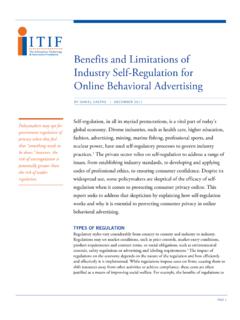Transcription of EXPANDING AND ENHANCING PUBLIC AND …
1 4TH HIGH LEVEL FORUM ON AID EFFECTIVENESS. EXPANDING AND ENHANCING PUBLIC AND PRIVATE CO-OPERATION FOR. BROAD- based , inclusive AND sustainable growth . A joint Statement for endorsement by representatives from the PUBLIC and the private sectors at the Fourth High-Level Forum on Aid Effectiveness 11 November 2011. The Fourth High-Level Forum on Aid Effectiveness in Korea promotes a more effective and catalytic role of aid to leverage other forms and sources of support for development, including from corporations and other private sector entities, in order to accelerate poverty reduction and boost sustainable economic, social and environmental development.
2 It is in this regard that we, Ministers of developing and developed countries, representatives of private sector entities and corporations and heads of multilateral and bilateral institutions and regional organizations meeting in Busan, encourage greater cooperation between the PUBLIC and the private sectors, with the objective of better understanding our respective contributions towards common development objectives, building on existing initiatives. Representatives from the PUBLIC and private sectors, as well as any additional development actors, are therefore invited to express their support for this statement which builds on past months active dialogue amongst a range of actors and entities, and is presented on the occasion of the Fourth High-Level Forum on Aid Effectiveness.
3 ACKNOWLEDGEMENT. While recognizing the differing objectives of the private and the PUBLIC sectors, and in particular stressing that the responsibility and accountability for sustainable and inclusive development ultimately lie with governments, this joint statement recognizes the critical importance of the for- profit private sector1 as a key engine of economic growth , job creation, innovation and sustainable development. The private sector is now widely acknowledged as a key partner in development, including through establishing new enterprises, creating jobs, providing goods and services, generating income and profits, and contributing to PUBLIC revenues, which are critical to increasing countries' self-reliance and sustainable growth .
4 This joint statement fully recognizes the diverse forms of engagement that the private sector brings to support development, together with governments, donors and civil society. These include core business activities, PUBLIC private partnerships, social responsibility activities, and cross-sector or multi-stakeholder partnerships for development. This joint statement recognizes the important role played by governments and other PUBLIC development actors in enabling and leveraging these private sector activities. It stresses the common objective across all partners to build on the various forms of private sector engagement, including investment, capacity building, inclusive business models, knowledge sharing and innovation and contributions to policy dialogue.
5 It also recognizes the importance of developing more conducive environments for entrepreneurship and private enterprise, domestic market 1. The private sector is a broad term that encompasses a range of diverse actors. It covers both formal and informal enterprise, micro, small, medium, and large enterprises, local and global enterprise, private financial institutions, as well as business associations, including women's business associations. 1. 4TH HIGH LEVEL FORUM ON AID EFFECTIVENESS. growth , participation in international trade, capital investment and realization of the full potential of human capital in countries. Recognizing the private sector as an equal, complementary partner in discussing and identifying solutions and actions to promote development effectiveness, we jointly agree to the five shared principles presented below, and together will consider possibilities for coordinated actions over coming years that would positively impact on development.
6 In promoting such coordination, collaboration and effective country-grounded joint strategies and programming, we seek to turn the diversity of development co-operation actors into an asset for the countries themselves, and not to add to the current complexity and fragmentation of the development landscape. FIVE SHARED PRINCIPLES. We, Ministers of developing and developed countries, representatives of private sector entities and corporations and heads of multilateral and bilateral institutions and regional organizations, recognize the importance of the following principles to maximize the benefit of coordination and collaboration to support development: (1) inclusive dialogue for building a policy environment conducive to sustainable development: We recognize that an inclusive dialogue between the PUBLIC and private sectors is needed to improve cooperation amongst all actors, develop synergies and generate new effective partnerships for development.
7 Governments should consult closely with the domestic and foreign private sectors in order to create an enabling environment for development which promotes peace and stability, the rule of law, enforcement of human rights, good governance with accountability and transparency, the absence of corruption, adequate economic and social infrastructure, stable economic policy, an educated workforce, clear property rights and enforceable contracts, enhances the competitiveness of the local private sector and promotes equitable growth . (2) Collective action: We believe that development requires the establishment of more permanent interactive platforms for dialogue both at the country and global levels where they do not exist - to enable sustainable and competitive private sector development and the involvement of the private sector in finding solutions to development challenges.
8 Consultation with the private sector in the elaboration of national and sector plans is a prerequisite to broadening country ownership of the development process and ensuring inclusive growth , and EXPANDING economic opportunity for all segments of the population. (3) Sustainability: We recognize that aid and other development efforts should scale up development impact in a sustainable manner and align with local priorities and capacities. PUBLIC and private activities should comply with relevant national laws and respect applicable international norms promoting social, environmental, financial, economic as well as good governance progress2. (4) Transparency: We recognize that long-term private sector development as well as effective national budgeting and governance benefit from policies which are predictable and designed and implemented in a transparent way.
9 More progress can be made to encourage greater transparency of PUBLIC -private cooperation including PUBLIC -Private Partnerships, building on, where appropriate, ongoing transparency and accountability initiatives3 in sectors which are critical to developing 2. Examples which might be applicable include: the ILO Tripartite Declaration of Principles concerning Multinational Enterprises and Social Policy, the UN Global Compact, the OECD Guidelines for Multinational Enterprises and IFC. performance standards 3. Examples which might be applicable include: the Extractive Industry Transparency Initiative (EITI), the Natural Resource Charter, the Kimberley process, the Forest Law Enforcement, Governance and Trade (FLEGT) initiative and the Construction Sector Transparency initiative (CoST).
10 2. 4TH HIGH LEVEL FORUM ON AID EFFECTIVENESS. countries' economies. More transparency and a predictable institutional environment, including effective and transparent procurement systems, are critical conditions to unlock the full potential of private enterprise and open markets in a way that contributes to sustainable and equitable growth . We believe that it is important to promote transparency of all players relevant for PUBLIC private cooperation including PUBLIC -Private Partnerships, including business, governments and international organizations, subject to valid concerns about commercially sensitive information. (5) Accountability for results: Our partnership should aim to foster discussion on options for monitoring, reporting and evaluation of development results, measuring the sustainable impact of PUBLIC -private cooperation for development, including PUBLIC -Private Partnerships, and to sharing the lessons learned from our partnership.












